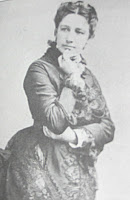Critics haven’t been particularly kind to “O Captain! My Captain!” down the years, perhaps because it’s too simple, too direct, and too damned popular. But poetry criticism isn’t the bailiwick of Dead Presidents Daily. Presidents are, and there’s no arguing that the poem is part of the lore of Lincoln. So here it is, in its entirety.
O Captain! my Captain! our fearful trip is done;
The ship has weathered every rack, the prize we sought is won;
The port is near, the bells I hear, the people all exulting,
While follow eyes the steady keel, the vessel grim and daring.
But O heart! heart! heart!
O the bleeding drops of red!
Where on the deck my Captain lies,
Fallen cold and dead.
O Captain! my Captain! rise up and hear the bells;
Rise up! For you the flag is flung, for you the bugle trills:
For you bouquets and ribboned wreaths, for you the shores a-crowding:
For you they call, the swaying mass, their eager faces turning.
Here Captain! dear father!
This arm beneath your head;
It is some dream that on the deck,
You've fallen cold and dead.
My Captain does not answer, his lips are pale and still;
My father does not feel my arm, he has no pulse nor will;
The ship is anchor'd safe and sound, its voyage closed and done;
From fearful trip the victor ship comes in with object won!
Exult, O shores, and ring, O bells!
But I with mournful tread,
Walk the deck my Captain lies,
Fallen cold and dead.
Less famous, but a better poem according to some, is “When Lilacs Last in the Dooryard Bloom'd.” It too is about the martyred 16th president, though not nearly as directly. It is too long to reproduce here, but this is one of the stanzas. (The whole text is here.)
Coffin that passes through lanes and streets,
Through day and night with the great cloud darkening the land,
With the pomp of the inloop’d flags with the cities draped in black,
With the show of the States themselves as of crape-veil’d women standing,
With processions long and winding and the flambeaus of the night,
With the countless torches lit, with the silent sea of faces and the unbared heads,
With the waiting depot, the arriving coffin, and the sombre faces,
With dirges through the night, with the thousand voices rising strong and solemn,
With all the mournful voices of the dirges pour’d around the coffin,
The dim-lit churches and the shuddering organs—where amid these you journey,
With the tolling tolling bells’ perpetual clang,
Here, coffin that slowly passes,
I give you my sprig of lilac.



























